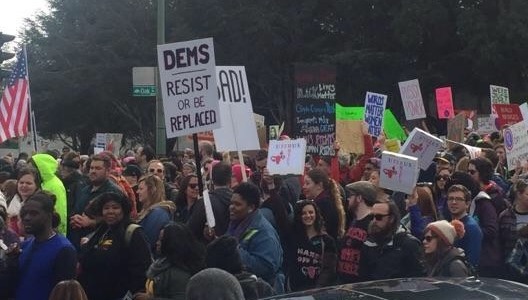I think it’s time to lower the voting age to 16.
This is something I’ve felt strongly about since I was in high school and bummed that I couldn’t vote in the 2004 presidential election (my parents can attest to me loudly voicing my frustration on this matter). I REALLY wanted to vote in high school. I registered way before I turned 18, even though I knew I’d have to re-register with a new address before an election I could vote in actually came up. Hell, I was so annoyed that I missed being able to vote in the 2006 midterms by a few months, when it looked like my district might finally swing to the left and we could boot our corrupt Republican Congressman, that I tried to convince my apathetic 18-year-old friend to register and let me “advise” her on how to fill out her ballot. Yes, I know that is illegal, but dammit, I was more politically aware than plenty of adults, and it seemed unfair and nonsensical that they had this right and I didn’t. I even wandered into my precinct’s polling place and casually asked them if I could fill out a ballot (spoiler: they didn’t let me). I was really excited to be part of the democratic process and I went out of my way to inform myself on the issues. Though most of my peers probably didn’t feel the same way, I don’t think that apathy is inevitable. I think it’s totally possible for teenagers to get interested and informed about politics, and to be effective— just look at the political action spearheaded by teenagers in the wake of the Parkland massacre. We should respect them by giving them the right to vote. I can think of plenty of good reasons why 16- and 17-year-olds should be able to vote, and no good reasons why they shouldn’t (though a number of arguments have been made against giving them the vote, and I’m open to hearing and debating about others). Let’s delve into it.
The maturity question
The main argument against lowering the voting age is generally that kids are too immature or don’t have enough life experience to make informed voting decisions. This is condescending and just plain false. First of all, it’s essentially saying, “Hey teenagers, you’re dumb and make bad decisions, so you can’t possibly be capable of thinking intelligently about important issues.” While it may be true that people’s brains keep developing into their mid-20s, we don’t consider that a good reason to keep anyone under 25 from voting, nor do we take voting rights away from people with demonstrable cognitive deficiencies. As long as you are older than 18 and not a felon, you can vote even if you have dementia, or are blackout drunk, or believe that you are second coming of Christ, or think that Hillary Clinton was running a child sex trafficking ring out of a pizza parlor. We don’t apply an intelligence or critical thought test to anyone over 18 before giving them the right to vote, and yet we automatically assume that people under 18 aren’t cognitively advanced enough to handle the issues being voted on. Give me a break, and give kids some credit. They have valuable things to say, and many have done more to further an intelligent civic discourse than most adults.
Furthermore, I doubt there’s much difference in the cognitive abilities of someone who is 18 versus someone who is 17.5, and yet the 18-year-old gets to vote while the 17.5-year-old doesn’t. The voting age is kind of arbitrary in this way. The counterargument to that would be that we have to set the cutoff somewhere, but by setting it at 18, we’re disenfranchising people who are fully capable of making informed voting decisions. The type of cognitive skills needed for voting are known as cold cognition, and they are established before a person turns 16. These are the skills that allow people to make rational decisions based on assessing evidence before coming to a conclusion, without being influenced by emotion. Teenagers can absolutely do this, and they can absolutely use those skills to make responsible choices at the ballot box. In fact, in Austria, one of the only countries to allow 16- and 17-year-olds to vote, research shows that youth voters make voting decisions that are similar to those of people over 18. So no, they aren’t irrational and impulsive at the ballot box. When it comes to their voting choices, they’re just like all of us supposedly older and wiser voters.
Making the political process belong to them
Allowing 16- and 17-year-olds to vote would get them engaged in the political process early. Right now for a lot of teenagers, it probably feels pointless to pay attention to politics (or government matters in general) because they have no say in it, and it seems like something not worth worrying about until they are considered adults. They don’t feel any ownership of it because they’re excluded from participating in it. But political decisions affect everyone in this country, including those too young to vote. Congress kowtowing to the NRA and refusing to pass meaningful gun control has allowed kids to be massacred while trying to get an education. Even if those kids want to vote out the politicians who sit on their hands while angry white men/boys shoot up schools, something that directly impacts kids in a literal life-or-death way, they can’t do it. But if they were allowed to vote, they could feel empowered to make great changes in society and work to ensure their own safety (which they shouldn’t have to do, but that’s what things have come to). They could feel like civic engagement was another milestone to reach in adolescence, as opposed to an opt-in burden to take on as an adult or something that doesn’t belong to them. Let’s give kids a better reason to get engaged than having to fear for their lives due to school shootings.
Increasing voter turnout and easing the transition to civic engagement
We have a problem with voter turnout in the US. Youth voter turnout is particularly low; 46% of eligible voters aged 18-29 voted in the 2016 presidential election, and turnout is even lower during midterm elections. Of course, this doesn’t help with the stereotype that young people are uninformed and apathetic. Facilitating voting in schools would be a great way to easily bring young people into the voting process. On election day, there could be polling sites at high schools, and students 16 and older could be granted time to go and cast their ballots. Perhaps teachers could even give extra credit to students who vote, proven by bringing back a ballot stub to class after going to the polls (their peers who are younger than 16 could also receive extra credit for learning about the issues and voting in a mock election, to make things equitable). Nonpartisan information about the issues could be distributed to students in class (the same information that gets mailed to adult voters). I think that getting people started voting early, so they see what it’s like and get in the habit of learning about the issues and candidates, will set them up to keep voting later in life when they have to be independently responsible for it.
Right now we don’t do much to make teenagers feel any ownership of voting or political engagement, but then we expect them to immediately become independently engaged the moment they turn 18. Some adults even have the gall to chastise young people who don’t vote and blame them for unfavorable political outcomes. Fuck off with that argument. We aren’t setting teenagers up to vote easily or to care about civic engagement, when we definitely could. Why not help them? Obviously this won’t solve all of the voter turnout problems in the US, but I believe that supporting people in civic engagement early on would do a lot to motivate people down the road.
No taxation without representation
16-year-olds can work and pay taxes, and yet they have no say in what their tax money is spent on. This can definitely affect them directly: they have to pay into a system, but if their Congressperson wants to defund public schools or take away regulations on student loans meant to protect the borrower, they can’t do anything about it other than suffer the consequences. This is taxation without representation, which is why the US became an independent nation in the first place. And being taxed on their income isn’t the only thing teenagers can be compelled to do without having any kind of say. Teenagers can be tried as adults in court, seemingly acknowledging that they’re capable of adult-level cognition as applied to criminal activity, but for some reason not to civic engagement. They (particularly teenage girls) can get married before the age of 18 as long as their parents “consent”, which often equates to parents forcing their daughter to marry her abuser. In the eyes of the law, she is old enough to get married and deal with all the responsibilities and ramifications associated with that, but she is not old enough to make an informed decision to vote against policies and lawmakers who support child marriage. How backwards is that? If we can force teenagers to do these things, we are obligated to give them a say in the matter.
I think this issue has more momentum now than ever before. The students from Marjory Stoneman Douglas High School have shown us repeatedly that teenagers can be public voices for intelligent expression of the issues that affect society. They are not impulsive, or irrational, or incapable of understanding problems at the same level as adults. This isn’t a new phenomenon. Teenagers have always been capable of being informed, civic-minded voters, but adults have held them back. It’s time now that we empower them to take their rightful place as participants in our democracy.
Featured image: the Indonesian embassy in Washington, D.C.



